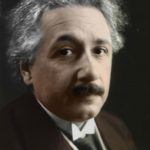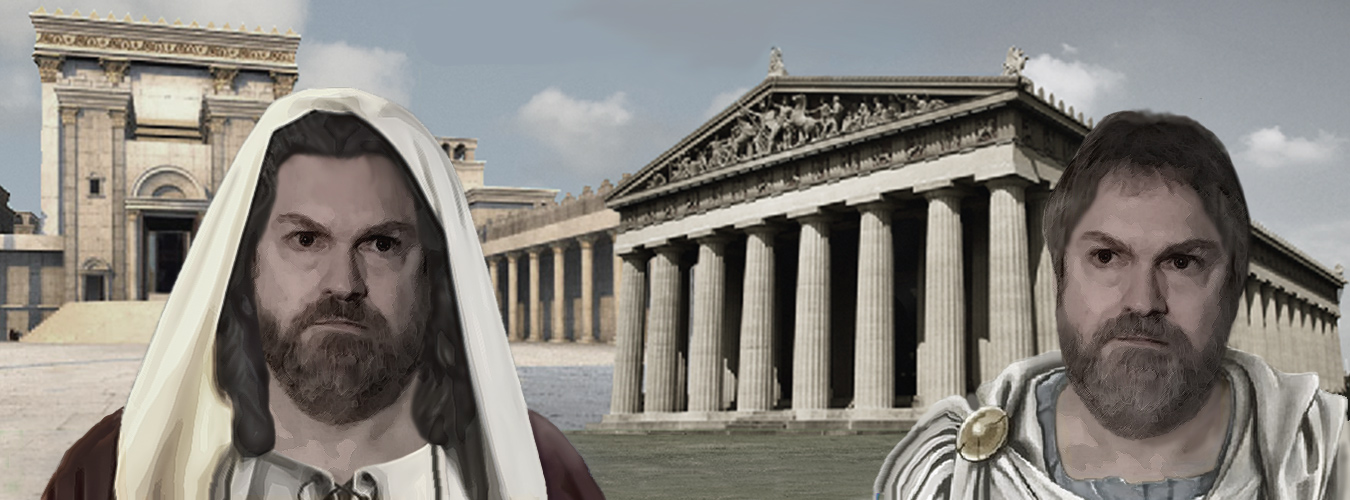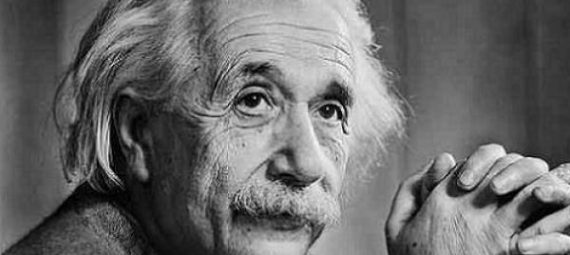
When discussing the subjects of God and science, the name Albert Einstein is inevitably raised. There’s nobody in the history of science who is held in higher regard than the Nobel prize winning physicist who gave us the theory of relativity which produced the famous equation E = mc2. For that reason both believers and unbelievers have sought to claim Einstein as one of their own. But what did Einstein really believe?
First of all, let’s establish a framework for the subject. Einstein lived to be 76. In the book Albert Einstein, Autobiographical Notes he stated “. . . I came—though the child of entirely irreligious (Jewish) parents—to a deep religiousness, which, however, reached an abrupt end at the age of twelve.” So according to Einstein, he had a strong faith up until age twelve. That means that he had 64 years to ponder the issue. I don’t know about you, but I’ve changed my views on a number of issues since I was twelve, especially religion. Despite his brilliance, Einstein was human and thus quite capable of wandering around theologically.
Einstein was born in Germany in 1879 at a time when the vast majority of the country was Christian. Although his parents were Jewish, they weren’t practitioners of any one faith.
“As a child, I received instruction both in the Bible and in the Talmud. I am a Jew, but I am enthralled by the luminous figure of the Nazarene.”
Knowing this, we would have to conclude that the biggest religious influence on Einstein in his youth was Christianity, although he was obviously exposed to Judaism as well.
The above quotation was followed by:
“Through the reading of popular scientific books I soon reached the conviction that much in the stories of the Bible could not be true. The consequence was a positively fanatic orgy of freethinking coupled with the impression that youth is intentionally being deceived by the state through lies; it was a crushing impression. Mistrust of every kind of authority grew out of this experience, a skeptical attitude toward the convictions that were alive in any specific social environment—an attitude that has never again left me, even though, later on, it has been tempered by a better insight into the causal connections. It is quite clear to me that the religious paradise of youth, which was thus lost, was a first attempt to free myself from the chains of the ‘merely personal,’ from an existence dominated by wishes, hopes, and primitive feelings. Out yonder there was this huge world, which exists independently of us human beings and which stands before us like a great, eternal riddle, at least partially accessible to our inspection and thinking. The contemplation of this world beckoned as a liberation, and I soon noticed that many a man whom I had learned to esteem and to admire had found inner freedom and security in its pursuit. The mental grasp of this extra-personal world within the frame of our capabilities presented itself to my mind, half consciously, half unconsciously, as a supreme goal. Similarly motivated men of the present and of the past, as well as the insights they had achieved, were the friends who could not be lost. The road to this paradise was not as comfortable and alluring as the road to the religious paradise; but it has shown itself reliable, and I have never regretted having chosen it.”
From this we can conclude that not only did Einstein come to reject the Bible in favor of science, he also came to embrace science as a sort of religion of its own.
Here are a few more quotations from various times in his life:
“I want to know how God created this world. I am not interested in this or that phenomenon, in the spectrum of this or that element. I want to know his thoughts. The rest are details.”
This was written around 1920, in a letter to a student named Esther Salaman. While he may not have believed in a personal god who is concerned about the trivial matters that mere mortals have to deal with, he certainly seems to envision a supreme being who created the universe in this text. He describes a thinking deity whose thoughts he wishes to know.
“I believe in Spinoza’s God who reveals himself in the harmony of all that exists, but not in a God who concerns himself with the fate and actions of human beings.”

In order to understand this statement you have to know what Spinoza believed. Spinoza was a 17th century Dutch philosopher. Like Einstein, he was a European Jew who departed from the conventional worldview of his people. While he completely rejected the view of a personal deity who speaks to man and interacts with people in the sense of rewards and punishment, he was not an atheist. He believed in an abstract and impersonal god in a manner that is usually branded as Classic Pantheism or Panentheism. He was first influenced by the French philosopher Renee Descartes, a devout Catholic who emphasized rationalism. Later on his main influence became Stoicism, the belief that the best approach to life is to understand the laws of the universe and to seek to cooperate with those laws rather than to implore God to change those laws. Spinoza saw God as somehow existing within the universe rather than outside of it, while also being infinite. In his view God is both comprehensible and incomprehensible. God did not create the universe because the universe is an extension of God and is therefore self-existent. If that sounds confusing that’s because it is, especially when we consider the fact that science has since concluded that the universe did in fact have a beginning which Einstein was certainly aware of, having lived long after this consensus was reached in the first half of the 20th century. Nevertheless, this was Einstein’s religion.
“Though religion may be that which determines the goal, it has, nevertheless, learned from science, in the broadest sense, what means will contribute to the attainment of the goals it has set up. But science can only be created by those who are thoroughly imbued with the aspiration toward truth and understanding. This source of feeling, however, springs from the sphere of religion. To this there also belongs the faith in the possibility that the regulations valid for the world of existence are rational, that is, comprehensible to reason. I cannot conceive of a genuine scientist without that profound faith. The situation may be expressed by an image: science without religion is lame, religion without science is blind.”
Here we see Einstein tipping his hat to religion in its quest to solve the mysteries of life and gain understanding.
“When I am judging a theory, I ask myself whether, if I were God, I would have arranged the world in such a way.”
This was stated during a discussion with his assistant Banesh Hoffmann. Here again, we see an apparent reference to a supreme being, a creator with supreme intelligence.
“What really interests me is whether God could have created the world any differently; in other words, whether the demand for logical simplicity leaves any freedom at all.”
This was stated to another assistant named Ernst Strauss.
“I believe that this is the God-given generalization of general relativity theory. Unfortunately, the Devil comes into play, since one cannot solve the [new] equations.”
He said this in referring to his unsuccessful attempts to find a theory that unified his theory of general relativity and quantum theory. Here Einstein is apparently using religious metaphors rather than literal references to spiritual beings. Nevertheless, the imagery is interesting. Was he somehow invoking God into his equations? Some have concluded that this was the case.
“I can, if worst comes to worst, still realize that God may have created a world in which there are no natural laws. In short: chaos. But that there should be statistical laws with definite solutions, i.e., laws that compel God to throw dice in each individual case, I find highly disagreeable.”
This was another reference to quantum mechanics. Einstein saw the universe as orderly and predictable, and he had a hard time embracing the seeming chaotic, unpredictability observed in the sub-atomic world of quantum physics.
“Had God been satisfied with inertial systems, he would not have created gravitation.”
Yet another reference to God as creator.
“My position concerning God is that of an agnostic. I am convinced that a vivid consciousness of the primary importance of moral principles for the betterment and ennoblement of life does not need the idea of a law-giver, especially a law-giver who works on the basis of reward and punishment.”
Here Einstein appears to depart from the belief in God, or else he is equating his belief in the god of Spinoza with agnosticism concerning the existence of a personal god.
“In the temple of science are many mansions, and various indeed are they that dwell therein and the motives that led them thither. Many take to science out of a joyful sense of superior intellectual power; science is their own special sport to which they look for vivid experience and the satisfaction of ambition; many others are to be found in the temple who have offered the products of their brains on this altar for purely utilitarian purposes. Were an angel of the lord to come and drive all the people belonging to these two categories out of the temple, the assemblage would be seriously depleted, but there would still be some men, of both present and past times, left inside… I am quite aware that we have just now light-heartedly expelled in imagination many excellent men who are largely, perhaps chiefly responsible for the building of the temple of science; and in many cases our angel would find it a pretty ticklish job to decide. But of one thing I am sure: if the types we have just expelled were the only types there were, the temple would never have come to be, any more than a forest can grow which consists of nothing but creepers. For these people any sphere of human activity will do, if it comes to a point; whether they become engineers, officers, tradesmen, or scientists depends on circumstances.”
Here we see the greatest examples of Einstein’s deification of the universe and his devotion to the religion of science.
From all of this we can conclude several things.
- Einstein was not a follower of Judaism or Christianity, although he had ample exposure to both.
- Einstein expressed respect for religion and used religious imagery when discussing science.
- Einstein expressed a belief in a god of creation in several instances.
- Einstein seemed to suggest the belief that God gave him the theory of relativity on at least one occasion.
- Einstein claimed to believe in the god of Spinoza, who is a pantheistic god who had no need to create the universe since the universe had no beginning and is an extension of god.
- Einstein’s expressed views on God are at times contradictory and hard to nail down, but he never clearly described himself as an atheist.
The fact that Einstein wasn’t an atheist doesn’t prove that God exists, just as it wouldn’t prove that God doesn’t exist if he had described himself as an atheist. What I take away from all of this information is simply this – those who dismiss the belief in God in whatever theological form as outdated, irrational, and silly have to explain how one of the greatest minds in the history of science could have expressed the clearly religious views that we have discussed. You can’t have it both ways, preserving your beautiful secularist cake while you gobble it up. You can’t say that religion is nonsense and that people who espouse religious views are stupid without applying that to Einstein, and if you don’t apply it to him you can’t justify applying it to anybody else.



I’d say that was all pretty good, till you get to the last paragraph and try to use Einstein’s views to say that if you think religion is nonsense you have to agree that Einstein was stupid. That is just false logic in my view.
As your many quotes show Einstein had a cultural belief in some sort of God at least at times, as I think was extremely common for people living in the late 1800s (whether they practiced any specific religion or not) and at the same time he finds his scientific views leading away from religion.
Being influenced by the norms of your culture instead of being informed only from what science can show is so, does not make one stupid, but merely human. We are highly emotional beings. To be strictly correct in a scientific view one can never assign 100% or 0% probability to the validity of any theory. So God existing is possible, but of vanishing small probability, much of which stems from things we have learned since Einstein’s death (as I think I have suggested before Sean Carol’s book The Big Picture is excellent on such matters).
Hello again, John. Since Einstein was born in 1879 that would have made him 12 years old in 1891, which means that he rejected the cultural view of God in the 1800s. The quote of his statement to Esther Salaman was in 1920, which was fifteen years after he had earned his PhD and twelve years after he had established himself as a renowned scientist. In 1929 he made the emphatic statement about believing in the god of Spinoza, so I think it’s unlikely that his statement in 1920 was due to cultural influence. In fact, his reference to the god of Spinoza was made to a Jewish rabbi.
To me it’s fairly simple. Einstein believed in the god of Spinoza. Spinoza wasn’t an atheist. He talked about God frequently, although it was clearly an unorthodox view that he held to. Einstein also spoke of God frequently as the above quotes prove.
The thing to remember is that he wasn’t referring to God in the way most people would assume without the proper context. Christians need to understand that. At the same time secularists need to acknowledge that he wasn’t an atheist. And everybody needs to realize that he was not a god or a theologian. He was human, and he expressed different views on the subject over his fifty years as a physicist, which likely contributed to the confusion.